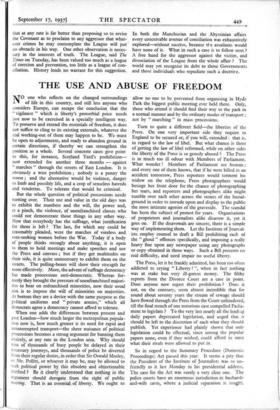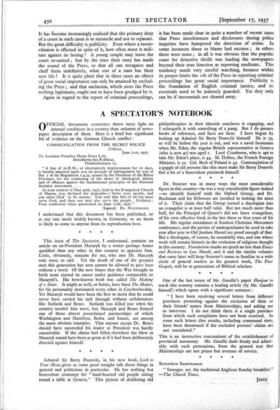THE USE AND ABUSE OF FREEDOM
NO one who reflects on the changed surroundings of life in this country, and still less anyone who considers Europe, can escape the conclusion that the " vigilance " which is liberty's proverbial price needs just now to be exercised in a specially intelligent way. To preserve and extend the essentials of freedom, it does not suffice to cling to its existing externals, whatever the real working-out of them may happen to be. We must be open to adjustments, and ready to abandon ground in certain directions, if thereby we can strengthen the position as a whole. Several concrete cases give point to this, for instance, Scotland Yard's prohibition— now extended for another three months — against " marches " through the streets of East London. It is obviously a wise prohibition ; nobody is a penny the worse ; and the alternative would be violence, danger to limb and possibly life, and a crop of senseless hatreds and vendettas. To tolerate that would be criminal.
But the whole question of political processions needs turning over. Their use and value in the old days was to exhibit the numbers and the will, the power and, at a pinch, the violence, of unenfranchised classes who could not demonstrate those things in any other way. Now that everybody has the suffrage, what justification for them is left ? The last, for which any could be reasonably pleaded, were the marches of voteless and vote-seeking women before the War. Today if a body of people thinks strongly about anything, it is open to them to hold meetings and make speeches and use the Press and canvass ; but if they get multitudes on their side, it is quite unnecessary to exhibit them on the streets. The polling-boxes will show their strength far more effectively. More, the advent of suffrage democracy has made processions anti-democratic. Whereas for- merly they brought the pressure of unenfranchised majori- ties to bear on enfranchised minorities, now their usual aim is to impose the will of minorities on majorities. At bottom they are a device with the same purpose as the political uniforms and " private armies," which all democrats agree a democracy cannot afford to tolerate.
When one adds the differences between present and past London—how much larger the metropolitan popula- tion now is, how much greater is its need for rapid and uninterrupted transport—the sheer nuisance of political processions becomes a strong argument for banning them entirely, at any rate in the London area. Why should tens of thousands of busy people be delayed in their necessary journeys, and thousands of police be diverted from their regular duties, in order that Sir Oswald Mosley, or Mr. Pollitt, or whoever it may be, may be allowed to seek political power by this obsolete and objectionable method ? Be it clearly understood that nothing in the argument should derogate from the right of public meeting. That is an essential of liberty. We ought to allow no one to be prevented from organising in Hyde Park the biggest public meeting ever held there. Only, those who attend it should find their way to the park in a normal manner and by the ordinary modes of transport ; not by " marching " in mass processions.
Turn to quite a different field—the liberties of the Press. On one very important side they require in England to be secured or, if you will, extended : that is, in regard to the law of libel. But what chance is there of getting the law of libel reformed, while on other sides the liberty of the Press is so grossly abused ? The Press is in much too ill odour with Members of Parliament. What wonder ! Members of Parliament are human ; and every one of them knows, that if he were killed in an accident tomorrow, Press reporters would torment his widow on the telephone, Press photographers would besiege her front door for the chance of photographing her tears, and reporters and photographers alike might tumble over each other across the stones of the burial- ground in order to intrude upon and display to the public the most intimate agonies of the graveside. The scandal has been the subject of protest for years. Organisations of proprietors and journalists alike disavow it, yet it goes on. If the disavowals are sincere, there is a simple way of implementing them. Let the Institute of Journal. ists employ counsel to draft a Bill prohibiting each of the " ghoul " offences specifically, and imposing a really heavy fine upon any newspaper using any photographs or copy obtained in those ways. Such a Bill presents no real difficulty, and need impair no useful liberty.
The Press, let it be frankly admitted, has been too often addicted to crying " Liberty ! ", when in fact nothing was at stake but very ill-gotten money. The filthy reports from the Divorce Court are a case in point. Does anyone now regret their prohibition ? Does it not, on the contrary, seem almost incredible that for round about seventy years the stream of sewage should have flowed through the Press from the Court unhindered, till the final stench of one notorious case compelled Parlia- ment to legislate ? To the very last nearly all the leadi_ig daily papers deprecated legislation, and urged that it should be left to the discretion of each what they should publish. Yet experience had plainly shown that only legislation could be effectual, since among the popular papers none, even if they wished, could afford to omit what their rivals were allowed to put in.
So in regard to the Summary Procedure (Domestic Proceedings) Act passed this year. It seems a pity that the President of the Institute of Journalists was so un- friendly to it last Monday in his presidential address. The case for the Act was surely a very clear one. The police courts have an enormous jurisdiction in husband- and-wife cases, where a judicial separation is sought. It has become increasingly-realised that the primary duty of a court in such cases is to reconcile and not to separate. But the great difficulty is publicity. Even where a recon- ciliation is effected in spite of it, how often must it mili- tate against its lasting I A young couple may leave the court re-united ; but by the time their story has made the round of the Press, so that all can recognise and chaff them indefinitely, what sort of a start has their new life ? It is quite plain that in these cases an object of great social importance can only be attained by exclud- ing the Press ; and that exclusion, which costs the Press nothing legitimate, ought not to have been grudged by it.
Again in regard to the report of criminal proceedings, it has been made clear in quite a number of recent cases that Press interferences and disclosures during police inquiries have hampered the detection of crime. In some instances those to blame had excuses ; in others there were none ; in all it was obvious that the popular craze for detective thrills was leading the newspapers beyond their true function as reporting mediums. This tendency needs very careful watching, because within its proper limits the role of the Press in reporting criminal proceedings has great social importance. Publicity is the foundation of English criminal justice, and its essentials need to be jealously guarded. Yet they only can be if inessentials are cleared away.











































 Previous page
Previous page